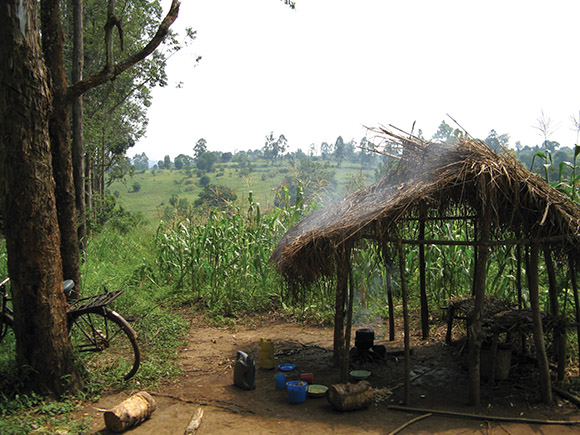 |
 |
| current issue |  |
past issues |  |
send a letter/news |  |
address update |  |
advertise |  |
about us |  |
alumni home |
In the Balance
Page 3 of 5
Previous | Next
Just as policy makers struggle to balance conserving resources with protecting people's livelihoods, researchers struggle to balance investigation with involvement. As much as he cares about the people he interviews, and as clearly as he can see their many needs, "we are not an aid organization," Hartter says. The researchers also are not government advisers, even though they hope the information they collect will influence official thinking. "We don't necessarily say something is a good practice or a bad practice," he says. "We're there to document the changes." The only way to learn about people's relationships to protected places is to spend a lot of time with them. Hartter encourages team members to help residents with small chores, like rounding up chickens or shucking corn, and also to buy local food and crafts and take photos that they'll later distribute to the families. Helping is a sign of interest and respect. Subsistence farmers devote most of their day to the tasks of survival. If they're giving up an hour to talk to a researcher, that researcher needs to show that he or she is aware of the sacrifice. And if it's OK for a researcher to help in small ways, what about bigger ones? When you have a vehicle in the villages, Hartter says, it's inevitable that you'll be asked to respond to some emergency. Just two weeks into his first Uganda visit, panicked people from a nearby village woke him in the middle of the night and asked him to drive a woman, whose skull had been hacked open by a machete, to a hospital 15 miles away. He didn't know the people, didn't know the area, and recognized the risks of encountering a nighttime ambush. Ambulance duty was not what had brought him to the village, and he realized that whatever he did would set a precedent for future requests.
And yet, a person in crisis needed his help. He ended up driving her—but not all the others who wanted to go along—and the woman recovered. Now he decides such requests as they arise, based on how well he knows and trusts the people involved. When others make different decisions, he understands. "If you're apprehensive, it's not that you don't want to help," he says. "With all the risks, you have to have all your senses dialed in." Most days, the researchers help by acting as a communication conduit. People in one village may not realize that nearby villages are having similar problems. Community meetings provide information to residents, who, in turn, share insights that can help policy makers. After one meeting, for example, Hartter was able to explain to park managers why a well-intentioned program of giving out free tree seedlings, while much appreciated, had failed to reduce deforestation. In tune with the seasons, the farmers alert researchers to the ways climate change is affecting their crops. The rainy season is changing, and their crops need consistent, predictable rain. The researchers have been helping them install weather stations so they can monitor rainfall. Records from previous decades are sketchy, but two years of work have laid the foundation for documenting changes from now on. Some farmers are already using the data to plant earlier or later, small steps that can make a huge difference in yield, and thus food security. "While the short-term headline is crop raiding," says Hartter, "the long-term headline is going to be climate change." |
blog comments powered by Disqus



